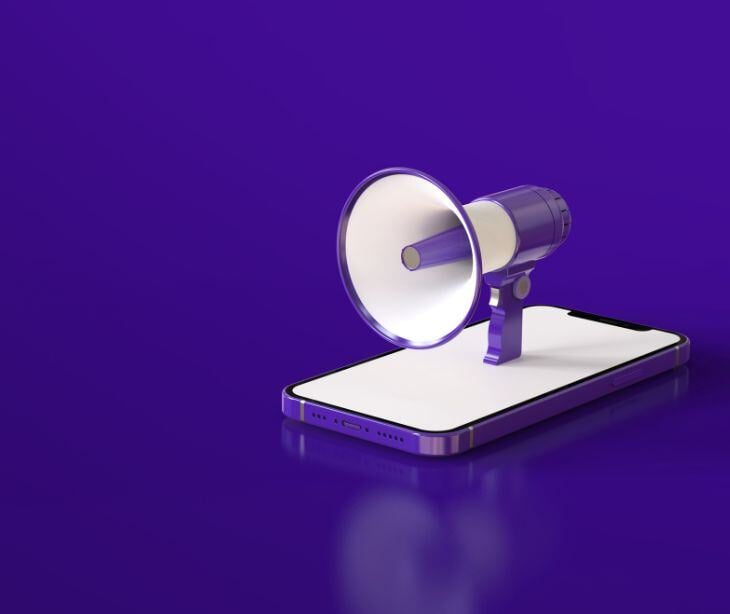
Providers can use HIPAA compliant texts to promote mental health in schools, workplaces, communities, and other settings to improve overall well-being.
What is mental health promotion?
According to the World Health Organization (WHO), “mental health promotion interventions improve overall well-being and are delivered in the settings where people live, work, learn, and thrive.”
These interventions can include:
- “school and workplace mental health programs,
- early childhood interventions,
- social support and community engagement,
- women empowerment,
- other interventions that address the social determinants of mental health.”
WHO also suggests that “to maximize impact, mental health promotion activities must be linked closely with mental health services, and engage a variety of health and non-health (e.g. education, labor, social welfare, justice, environment, etc.) sectors.”
How text messages can help
Text messaging is a convenient way for mental health promotion and prevention interventions to reach individuals, especially in hard-to-reach or underserved populations. Providers can text personalized support, reminders, and resources, increasing access to care and improving mental health outcomes.
However, HIPAA regulations mandate that providers protect patient privacy. HIPAA compliant text messaging platforms, like Paubox, automatically encrypt patients' protected health information (PHI) during transmission and at rest.
Go deeper: How HIPAA protects patients’ mental health information
Steps to ensure HIPAA compliant text messaging
1. Use a secure platform: Mental health providers must use a HIPAA compliant platform, like Paubox, to protect patient information from unauthorized access or potential data breaches.
2. Get patient consent: Providers must obtain explicit patient consent before initiating text communication and explain the types of information that will be sent.
3. Limit PHI in texts: Text messages should only include the minimum necessary information needed, according to HIPAA’s minimum necessary standard.
4. Regular audits and training: Regularly audit text messaging practices to ensure compliance and provide ongoing training for staff on HIPAA regulations.
Practical applications of HIPAA compliant text messaging
School mental health programs
HIPAA compliant text messages can support mental health programs in schools, reminding students about counseling sessions and sharing mental health tips.
For example, a school counselor can text, "Reminder: Your counseling session is tomorrow at 2 PM. Take a moment today to practice deep breathing."
Workplace mental health programs
HIPAA compliant texts can promote mental health in the workplace. Specifically, provider organizations can offer staff stress management techniques and encourage participation in mental health workshops.
For example, a HIPAA compliant text can say, "Join us for a stress management workshop this Friday at 3 PM. RSVP to reserve your spot!"
Early childhood interventions
Mental health providers can send parents HIPAA compliant texts with tips on supporting their child's emotional development and reminders for wellness check-ups.
For example, providers can send a simple text like, "Tip: Encourage your child to express their feelings. Reminder: Wellness check-up next Monday at 10 AM."
Community engagement
Community mental health programs can use texts to promote wellness activities, like community walks or meditation sessions, to promote social support and mental well-being.
Women empowerment programs
HIPAA compliant text messages can offer support and resources to women participating in empowerment programs. Specifically, providers can segment their texts so women receive personalized information to encourage empowerment.
For example, providers can send a HIPAA compliant text reminding women of an upcoming empowerment workshop on financial independence.
Additionally, these text messages are a discreet way for women to communicate with their providers and access resources without fear of judgment or stigma.
Read also: Using HIPAA compliant emails to overcome mental health stigma
FAQs
Who does HIPAA apply to?
HIPAA applies to healthcare providers, health plans, and healthcare clearinghouses that handle protected health information (PHI).
What makes a text HIPAA compliant?
An email is HIPAA compliant if it includes encryption, secure access controls, and audit trails. So, providers must use a HIPAA compliant texting platform, like Paubox, to protect patients’ PHI.
What are the penalties for HIPAA violations?
Penalties for HIPAA violations can range from fines of up to $50,000 per violation to criminal charges and imprisonment, depending on the severity and intent.
Go deeper: What are the penalties for HIPAA violations?
Subscribe to Paubox Weekly
Every Friday we'll bring you the most important news from Paubox. Our aim is to make you smarter, faster.



